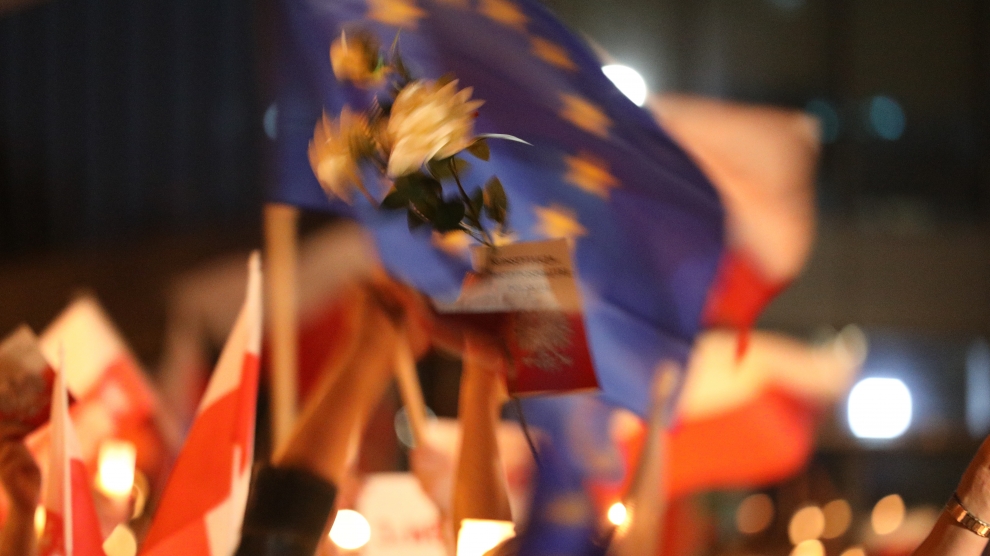Since Poland’s conservative Law and Justice (PiS) government was elected in October 2015, it has systematically moved to consolidate its power. The country’s public media have lost their independent voice. The powers of the supreme court have been curtailed. Managers of enterprises have been replaced. Human rights, especially for women, have been constantly undermined.
The latest and most damaging development with regard to the strength and durability of Poland’s democratic structures is PiS’s move against the entire judiciary. The country’s legislative, executive, and judicial powers will now be controlled by PiS and administered by the justice minister, Zbigniew Ziobro. New legislation pushed through the parliament during a late-night session on July 12 gives Ziobro the right to appoint and dismiss judges, including those on the supreme court. The independent body that nominated judges is being disbanded.
Furthermore, the justice minister now has the right to dismiss the presidents of regional and appellate courts. What this means is that if PiS wants to silence the opposition and its critics by bringing what opponents believe will be trumped-up corruption charges, the government will have a compliant judiciary at its disposal. PiS has “crushed the judicial system in Poland,” said Ewa Łętowska of the Polish Academy of Sciences.
The opposition has held demonstrations. Jarosław Kaczyński, the PiS leader, accused protesters of trying to stage a coup d’état. On July 16, Polish public television reported on the demonstrations with the caption: “The opposition attempts to organise a coup against the democratically elected government.” Such language will almost certainly become more widespread and conspiratorial in the run-up to regional elections due in 2018.
Kaczyński has never wavered in his belief that after 1989, Poland never had a real revolution that would have—in his view—cleansed the country’s system of Communists, their supporters, and the secret police. Since then, he has been waging his own relentless war against the liberal wing of the Solidarity trade union movement. For Kaczyński, it is they who have prolonged the old system. Had his nationalist wing of Solidarity been in the driver’s seat, things would have been entirely different—according to his narrative, which continues a quarter of a century later.
The vendetta has become so intense that Lech Wałęsa, the former leader of Solidarity, is vilified by PiS. He has been accused of conniving with the secret police. Poland’s school curriculum now presents a particularly jaundiced interpretation of the events leading up to 1989 and the years afterward. Wałęsa’s role hardly figures in school textbooks, if at all. Such is the politics of revenge that is playing out in Poland—to the detriment of the country’s democracy and place in Europe.
Over in Brussels, the European Commission is supposed to protect and uphold Article 2 of the EU’s founding treaty, which states, “The Union is founded on the values of respect for human dignity, freedom, democracy, equality, the rule of law and respect for human rights, including the rights of persons belonging to minorities.” On July 14, the EU issued a statement expressing “great concern” after the Polish parliament introduced a bill to force all supreme court judges to step down except those the justice minister wanted to remain. Not much of a rebuke.
It’s not as if European Commission Vice President Frans Timmermans is unaware of what is taking place in Poland. His strategy so far has been to pursue a dialogue with PiS—to no avail. The problem is that without any kind of pressure, PiS will be undeterred. One need only look at the experience of nearby Hungary, where Prime Minister Viktor Orbán has used his party’s two-thirds majority in the parliament to turn the country into a state based on loyalty, patronage, clientelism, and corruption.
The EU can either discard Article 2—as if civil society, the opposition, and what is left of the independent judiciary in Poland didn’t matter—or stop the flow of Poland’s EU structural funds, which are paid for by taxpayers. That is what the union should have done long ago in Hungary. But such a move would require the support of the EU member states, and Poland knows Hungary is on its side. PiS seems confident that penalties would never be agreed on. And then there is the argument that threats from Brussels will only harden PiS’s stance against the EU.
These are well-worn and tired arguments. By joining the EU, Poland and Hungary signed up to a set of obligations, values, and solidarity. The most recent developments in Poland show that Warsaw is making a mockery of the EU. But the union, with political will, still has time to change tack. After all, overwhelming majorities of Poles and Hungarians still back the EU. That support should no longer be ignored.
_______________
The views expressed in this opinion editorial are the author’s own and do not necessarily reflect Emerging Europe’s editorial policy.
The editorial was originally published on Judy Dempsey’s Strategic Europe blog.

